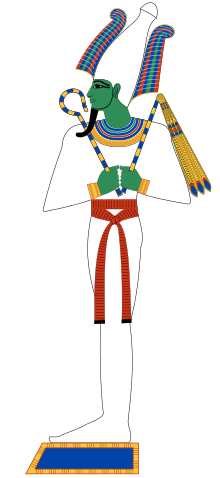Osiris
| Osiris | ||||
|---|---|---|---|---|
| God of the afterlife, death, life, and resurrection | ||||

Osiris, lord of the dead. His black-green skin symbolizes re-birth.
|
||||
| Name in hieroglyphs |
|
|||
| Major cult center | Abydos | |||
| Symbol | Crook and flail, Atef crown, ostrich feathers, fish, mummy gauze | |||
| Consort | Isis | |||
| Parents | Geb and Nut | |||
| Siblings | Isis, Set, Nephthys, Horus the Elder | |||
| Offspring | Horus | |||
Osiris (/oʊˈsaɪrᵻs/, alternatively Ausir, Asiri or Ausar, among other spellings), was an Egyptian god, usually identified as the god of the afterlife, the underworld, and the dead, but more appropriately as the god of transition, resurrection, and regeneration. He was classically depicted as a green-skinned man with a pharaoh's beard, partially mummy-wrapped at the legs, wearing a distinctive crown with two large ostrich feathers at either side, and holding a symbolic crook and flail. Osiris was at times considered the oldest son of the earth god Geb, though other sources state his father is the sun-god Ra, and the sky goddess Nut, as well as being brother and husband of Isis, with Horus being considered his posthumously begotten son. He was also associated with the epithet Khenti-Amentiu, meaning "Foremost of the Westerners", a reference to his kingship in the land of the dead. As ruler of the dead, Osiris was also sometimes called "king of the living": ancient Egyptians considered the blessed dead "the living ones".
Osiris was considered the brother of Isis, Set, Nephthys, and Horus the Elder, and father of Horus the Younger. Osiris is first attested in the middle of the Fifth dynasty of Egypt, although it is likely that he was worshipped much earlier; the Khenti-Amentiu epithet dates to at least the first dynasty, also as a pharaonic title. Most information available on the myths of Osiris is derived from allusions contained in the Pyramid Texts at the end of the Fifth Dynasty, later New Kingdom source documents such as the Shabaka Stone and the Contending of Horus and Seth, and much later, in narrative style from the writings of Greek authors including Plutarch and Diodorus Siculus.
...
Wikipedia
